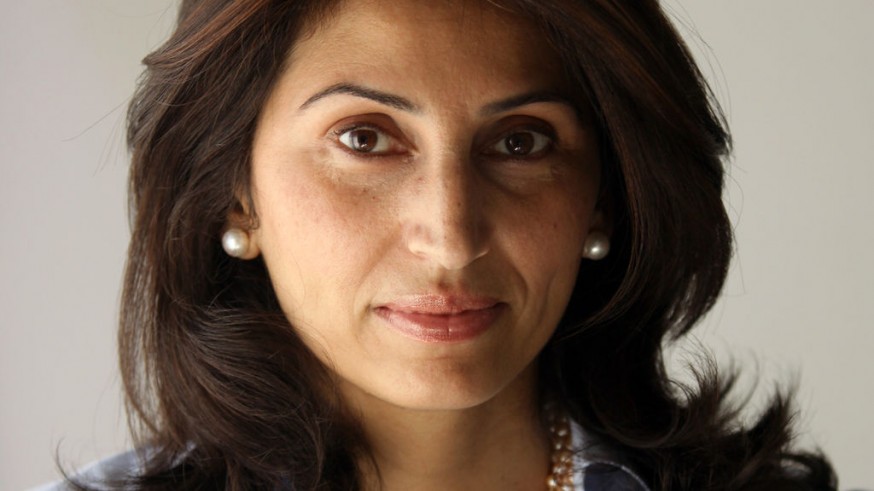www.aljazeerah.info
Opinion Editorials, June 2017
Archives
Mission & Name
Conflict Terminology
Editorials
Gaza Holocaust
Gulf War
Isdood
Islam
News
News Photos
Opinion Editorials
US Foreign Policy (Dr. El-Najjar's Articles)
www.aljazeerah.info
Greetings for Diana Buttu By Uri Avnery Al-Jazeerah, CCUN, June 3, 2017 |
 |
 |
|
A FEW days ago, a not so well-known Palestinian woman received an unusual honor. An article of hers was published on top of the first page of the most respected newspaper on earth: New York Times.
The editors defined the writer, Diana Buttu, as: "a lawyer and a former adviser to the negotiating team of the Palestine Liberation Organization".
I knew Diana Buttu when she first appeared on the Palestinian scene, in 2000, at the beginning of the second intifada. She was born in Canada, the daughter of Palestinian immigrants who tried hard to assimilate in their new homeland, and received a good Canadian education.
When the struggle in the occupied territories intensified, she returned to her parents' homeland. The Palestinian participants of the negotiations with Israel, which started after the Oslo agreement, were impressed by the young lawyer who spoke excellent English - something rare - and asked her to join the national endeavor.
When the negotiations died clinically, Diana Buttu disappeared from my eyes. Until her dramatic reappearance last week.
THE LOCATION and the headline of the article demonstrate the importance which the American editors saw in her argument. The headline was "Do we need a Palestinian Authority?" and further on, in another headline, "Shutter the Palestinian Authority".
The argument of Diana Buttu seduces by its simplicity: the usefulness of the Palestinian Authority has passed. It should be liquidated. Now.
The Palestinian Authority, she says, was set up for a specific purpose: to negotiate with Israel for the end of the occupation and the creation of the hoped-for Palestinian state. By its very nature, that was a task limited in time.
According to the Oslo agreement, the negotiations for ending the occupation should have reached their goal in 1999. Since then, 18 years have passed without any movement towards a solution. The only thing that has moved was the settlement movement, which has reached by now monstrous dimensions.
In these circumstances, says Buttu, the Palestinian Authority has become a "subcontractor" of the occupation. The Authority helps Israel to oppress the Palestinians. True, it employs a large number of educational and medical personnel, but more than a third of its budget - some 4 billion dollars - go the "security". The Palestinian security forces maintain a close cooperation with their Israeli colleagues. Meaning, they cooperate in upholding the occupation.
Also, Buttu complains about the lack of democracy. For 12 years now, no elections have taken place. Mahmoud Abbas (Abu-Mazen) rules in contravention of the Palestinian Basic Law.
Her solution is simple: "it's time for the authority to go." To abolish the authority, to return the responsibility for the occupied Palestinian population to the Israeli occupier and adopt a "new Palestinian strategy".
What strategy, exactly?
Up to this point, Buttu's arguments were lucid an logical. But from here on they become unclear and nebulous.
BEFORE GOING on, I have to make some personal remarks.
I am an Israeli. I define myself as an Israeli patriot. As a son of the occupying nation I don't think that I have the right to give advice to the occupied nation.
True, I have devoted the last 79 years of my life to the achievement of peace between the two nations - a peace that, I believe, is an existential necessity for both. Since the end of the 1948 war I preach the establishment of an independent State of Palestinian side by side with the State of Israel. Some of my enemies in the extreme Israeli Right even accuse me of having invented the "Two-State Solution" (thus deserving the title of "traitor".)
In spite of all this, I have always abstained from giving the Palestinians advice. Even when Yasser Arafat declared several times publicly that I am his "friend", I did not see myself as an adviser. I have expressed my views and voiced them many times in the presence of Palestinians, but from that point to giving advice, the distance is great.
Now, too, I am not ready to give advice to the Palestinians in general, and to Diana Buttu in particular. But I take the liberty to to make some remarks about her revolutionary proposal.
Reading her article for the second and third time, I gain the impression that it contains a disproportion between the diagnosis and the medicine.
WHAT DOES she propose that the Palestinians do?
The first step is clear: break up the Palestinian Authority and return all the organs of Palestinian self-government to the Israeli military governor.
That is simple. But what next?
Diana Buttu voices several general proposals. "Non-violent mass protests", "boycott, divestment and sanctions", "addressing the rights of Palestinian refugees" (from the 1948 war) and the "Palestinian citizens of Israel". She mentions approvingly that already more than a third of the Palestinian people in the occupied territories support a single-state solution - meaning a bi-national state.
With due respect, will these remedies - all together and each one separately - liberate the Palestinian people?
There is no proof that it will.
Experience shows the it is easy for the occupation authorities to turn a "non-violent mass protest" into a very violent one. That happened in both intifadas, and especially in the second. It started with non-violent actions, and then the occupation authorities called in snipers. Within a few days the intifada became violent.
The use of boycotts? There is now in the world a large movement of BDS against Israel. The Israeli government is afraid of it and fights against it with all means, including ridiculous ones. But this fear does not spring from the economic damages this movement can cause, but from the damage it may cause to Israel's image. Such image may hurt, but it does not kill.
Like many others, Buttu uses here the example of South Africa. This is an imagined example. The world-wide boycott was indeed impressive, but it did not kill the apartheid regime. This is a western illusion, which reflects contempt for the "natives".
The racist regime in South Africa was not brought down by foreigner, nice as they were, but by those despised "natives". The blacks started campaigns of armed struggle (yes, the great Nelson Mandela was a "terrorist") and mass strikes, which brought down the economy. The international boycott played a welcome supporting role.
Buttu has high hopes for "Palestinian boycotts". Can they really hurt the Israeli economy? One can always bring in a million Chinese workers.
Buttu also mentions the international court in the Hague. The trouble is that Jewish psychology is hardened against "goyish justice". Aren't they all anti-Semites? Israel spits on them, as it spit on the UNO resolution at its time.
WHAT IS left? There is only one alternative, the one Buttu wisely refrains from mentioning: terrorism.
Many peoples throughout history started wars of liberation, violent struggles against their oppressors. In Israeli jargon that is called "terror'.
Let's ignore for a moment the ideological aspect and concentrate on the practical aspect only: does one believe that a "terrorist" campaign by the occupied people against the occupying people can, under existing circumstances, succeed?
I doubt it. I doubt it very much. The Israeli security services have shown, until now, considerable ability in fighting against armed resistance.
If so, what remains for the Palestinians to do? In two words: Hold on.
And here there lies the special talent of Mahmous Abbas. He is a great one for holding on. For leading a people that is passing a terrible ordeal, an ordeal of suffering and humiliation, without giving in. Abbas does not give in. If someone will take his place, somewhere in the future, he will not give in either. Not Marwan Barghouti, for example.
As a young man I was a member of the Irgun, the underground military organization. During Workd War II, my company organized a "trial" for Marshal Phillip Petain, who became head the French government after the French collapse. This "government" was located in Vichy and took orders from the German occupation.
Much against my will, I was appointed counsel for the defense. I took the job seriously, and, to my surprise, discovered that Petain had logic on his side. He saved Paris from destruction and made it possible for most of the French people to survive the occupation. When the Nazi empire broke down, France, under Charles de Gaulle, joined the victors.
Of course, Diana Buttu does not refer to this emotion-laden historic example. But one should remember.
A FEW days before the publication of Buttu's article, a leader of the Israeli fascist right, Betsalel Smotrich, a deputy chairman of the Knesset, published an ultimatum to the Palestinians.
Smotrich proposed to put the Palestinian before a choice between three possibilities: to leave the country, to live in the country without citizenship rights or to rise up in arms - and then the Israeli army "would know how to deal with them".
In simple words: the choice is between (a) the mass expulsion of seven million Palestinians from the West Bank (including East Jerusalem), Israel proper and the Gaza Strip, which would amount to Genocide, (b) life as a people of slaves under an Apartheid regime and (c) simple genocide.
The unclear proposal of Buttu constitutes, in practice, the second choice. She mentions that many Palestinians approve of the "one-state solution". She shies away from a clear-cut statement and hides behind a formula that is becoming fashionable these days: "two-states or one state". Rather like: "swimming or drowning".
This is suicide. Dramatic suicide. Glorious suicide. Suicide none the less.
Both Buttu and Smotrich lead to disaster.
After all these years, the only practical solution remains as it was at the beginning: two states for two peoples. Two states that will live side by side in peace, perhaps even in friendship.
There is no other solution.
***
Share the link of this article with your facebook friends
|
|
|
|
||
|
||||||


